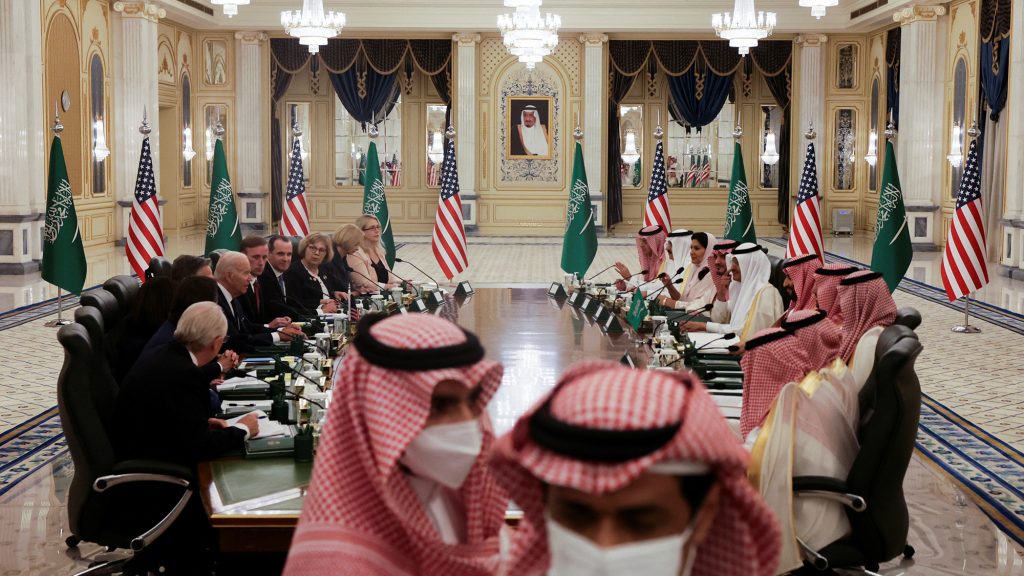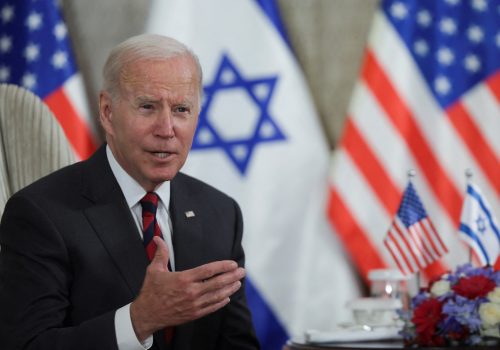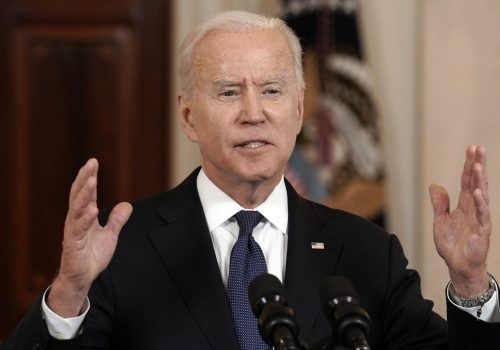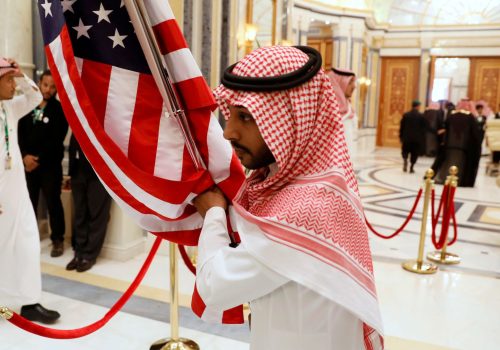Don’t be distracted by the fist bump. Assumptions about the greeting between US President Joe Biden and Saudi Crown Prince Mohammed bin Salman (better known as MBS) during the former’s visit to the kingdom last week are overblown. Despite the outsize coverage of the visit, the takeaways for both sides were less than thrilling.
Even before he arrived in Riyadh, Biden had already endured the blows he was going to receive from the left of his party for traveling to Saudi Arabia. The items he checked off his foreign-policy wish list during the visit—such as ramping up green energy coordination and securing the transfer of two islands to Saudi control—aren’t summit-worthy, but his setting foot in the kingdom was required to unlock them. Despite the fierce criticism of his visit from certain corners, nothing he did there will cost him votes.
For his part, MBS got what he needed as soon as Biden walked off the plane. Domestically, it anointed him: It was proof to his detractors that any US administration will, in fact, work with him. In Washington, lobbying firms treated Saudi Arabia like a leper after the murder of Washington Post columnist Jamal Khashoggi—but are now signing back up to work for the kingdom. Biden’s visit sent the message that it’s once again palatable to do business with Saudi Arabia, and foreign direct investment is likely to tick up.
Saudi Arabia was hoping for assurances that the United States will act as the kingdom faces continuing attacks by Iran’s power-hungry armed affiliates on its side of the Gulf. If Riyadh was looking for commitments, definitions of red lines, or tiers of action, it didn’t get them from this visit—and nor should it expect them. Neither side of the American political aisle is in favor of tying the United States to additional military obligations.
The joint communiqué released after Biden’s meeting with MBS was essentially a list of things Washington and Riyadh are already working on together. A summit wasn’t required to achieve any of it—though the communiqué is useful for reminding Americans of the many areas of cooperation that make the relationship valuable to both countries. For Riyadh, the much-touted agreement to allow Israeli overflight on its territory and transfer two Red Sea islands to Saudi control is great news on its own; it also helps MBS sell the idea of eventual normalization to his public. But every Saudi watcher knows that no confidence-building measure is going to flip the switch toward normalization in Riyadh.
This trip was, at its root, Biden keeping a promise to Saudi Arabia that he would come to the kingdom himself if oil production was accelerated in July and August. Instead of justifying the trip in the Washington Post, Biden should have framed it as a one-stop-shop for advancing his agenda by meeting the heads of state of multiple nations critical to US interests. Topics like food security and climate change, which were in fact covered during the summit, have been a side note in the discourse about the trip.
Many challenges remain—particularly for Washington. Biden will need to manage energy-related expectations among the American public, which wants immediate relief from high gas prices. Saudi Arabia made all the promises it can keep about oil production before Biden even left Washington; the previously promised production ramp-up by the Organization of the Petroleum Exporting Countries (OPEC) began in July, and the market has already registered the impact. We may see a statement saying that Saudi Arabia will continue to boost production moving forward “in our commitment to global energy stability as the world’s top swing producer” or something along those lines, but the increments will be minuscule and over a timeline that extends through 2026. Scott Modell, managing director of Rapidan Energy Group, points out that “the White House fact sheet about the visit conveyed expectations for action on production in coming weeks, but the joint communiqué was silent on that.” There may be a market blip for a few days when those aspirational increases are mentioned publicly, but there won’t be a change that will cause Americans to celebrate at the pump.
Before Biden’s visit to the kingdom, Israel didn’t do him any favors by setting public expectations about integrated air and missile defense (IAMD) being further along than it is. The hub-and-spoke model envisioned by US Central Command (CENTCOM)—in which each member state shares information about airborne threats only with the United States, which sanitizes it and shares only on a strictly need-to-know basis—is nascent and not ideal. This is inefficient almost to the point of negating the entire point of integrated defense. But it’s unavoidable due to the crippling mistrust between nations in the Gulf.
Iran responded to the announcement by calling theoretical IAMD a threat to its national security—which won’t make US Envoy to Iran Robert Malley’s job any easier. While it’s important for the region to hear from Biden that this project is in fact a priority for his administration and a testament to the US commitment to regional security, nobody in the administration intended for the president’s trip to result in any leaps forward. And due to that regional mistrust, it won’t.
IAMD is one pillar of CENTCOM’s Regional Security Construct (RSC), which is still under development—and saw virtually no progress on this trip. The visit lightly brushed two of the RSC’s other four pillars (battling violent extremism and countering unmanned aerial systems) and it won’t move the needle on the others (deterring Iran and gaining an upper hand in the strategic competition with China and Russia). This was evidenced by Emirati comments that “the UAE is not going to be a party to any group of countries that see confrontation as a direction” and restating Emirati neutrality between Russia and the United States. This opposition allows the UAE to make a goodwill gesture to Iran as they discuss the exchange of ambassadors (which both will tail with so much intel that they’ll think they’re living in the Truman Show), but is likely more about Abu Dhabi’s bitterness that Biden is not agreeing to a bilateral NATO Article 5-style collective defense agreement. Still, CENTCOM can read Abu Dhabi’s statement that it could participate in a project that is purely defensive and focused on missiles and drones to mean that IAMD may be on the table even if the RSC will require some tweaking before adoption.
Riyadh is hoping for progress on the foreign military sales currently stalled in the United States by the State Department’s concerns over human-rights abuses and distaste in Congress for the war in Yemen. But it won’t get much; the administration was still arguing internally about which, if any, sales to push through as Biden left Washington. A new and more restrictive Conventional Arms Transfer policy is on the verge of release, purposely held until after this trip. Clarke Cooper, a former assistant secretary for political-military affairs at the State Department (and an Atlantic Council nonresident senior fellow) confirmed as much to me: “Now that the president’s trip to the Middle East is complete, interagency colleagues acknowledge plans to roll out a new Conventional Arms Transfer policy despite the lack of a complete National Security Strategy.”
Also notable is that the House just passed new legislation further limiting arms sales in ways that will impact Saudi Arabia and Egypt, among others. On the heels of news that Iran is providing Russia with drones and drone expertise, we should expect a few justifiably snarky “I told you so” comments from regional partners who have asked the United States for years for additional tools to counter the drone threat from Iran.
Visit or not, Washington and Riyadh are still talking past one another. Saudi Arabia’s definition of US commitment, as well as the Gulf’s more broadly, does not align with the amount of skin the United States is willing to put in the game. There is a similar disconnect on definitions of human rights. This is not unique to 2022 or the Biden administration—but it’s the reason that earnest engagement is so important. This trip was, like its deliverables, just a baby step.
Kirsten Fontenrose is a nonresident senior fellow at the Atlantic Council’s Scowcroft Middle East Security Initiative. Until December 2021, she served as the director of the initiative.
Further reading
Fri, Jul 15, 2022
Experts react: What’s next for the Middle East after Biden’s big visit?
MENASource By Daniel B. Shapiro, Barbara Slavin, Ariel Ezrahi, Thomas S. Warrick, Shalom Lipner, Carmiel Arbit, Nadereh Chamlou, Sina Azodi, Mark N. Katz, Andrew L. Peek
The trip focuses on repairing relationships across the region in an effort to foster regional stability and advance normalization with Israel. Atlantic Council experts react to the trip and what it means for the wider region.
Tue, Jul 12, 2022
Biden’s big chance to build a new coalition in the Middle East
New Atlanticist By Daniel B. Shapiro
A regional coalition is emerging of US partners who face common security threats and share similar social, economic, energy, and climate-related challenges.
Tue, Jul 12, 2022
How to rescue and rebuild the US-Saudi relationship
New Atlanticist By Jonathan Panikoff
The United States cannot ensure its economic and national security as successfully without Saudi Arabia as a key ally.
Image: US President Joe Biden participates in a bilateral meeting with Saudi Arabia's Crown Prince Mohammed bin Salman, at Al Salam Royal Palace, in Jeddah, Saudi Arabia on July 15, 2022. Photo via REUTERS/Evelyn Hockstein.



